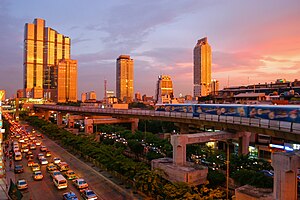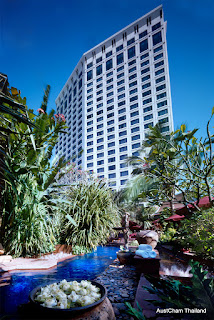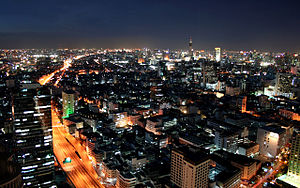 Among the many businesses and individuals affected by the recent protests in Thailand, the hospitality sector, especially in Bangkok, was one of the hardest hit. A number of major hotels close to the turmoil were even forced to close for a period while others remained open albeit with extremely low occupancies. Travel warnings issued by some countries led tourists to cancel their trips while some companies doing business in Thailand instructed their staff to avoid visiting the Kingdom as their insurance did not cover travel during periods of civil unrest.
Among the many businesses and individuals affected by the recent protests in Thailand, the hospitality sector, especially in Bangkok, was one of the hardest hit. A number of major hotels close to the turmoil were even forced to close for a period while others remained open albeit with extremely low occupancies. Travel warnings issued by some countries led tourists to cancel their trips while some companies doing business in Thailand instructed their staff to avoid visiting the Kingdom as their insurance did not cover travel during periods of civil unrest.Thailand and her people have always been regarded as peaceful and welcoming so to most potential tourists and previous visitors, the recent events came as a surprise and has certainly affected Thailand’s image among this core market.
 Overcoming this wave of negative publicity presents a formidable challenge to the hospitality industry in the short term, however most key players contacted for this article expressed optimism that, in the medium to long term, the sector will bounce back from this latest setback as it has done before.
Overcoming this wave of negative publicity presents a formidable challenge to the hospitality industry in the short term, however most key players contacted for this article expressed optimism that, in the medium to long term, the sector will bounce back from this latest setback as it has done before. Gathering together comments from major hotel operators in Thailand, particularly Bangkok which was most affected, the predictions and actions undertaken generally concur. In the face of these challenges it is encouraging to note that for the most part hoteliers present a united front together with the strategic efforts of the Government, Tourism Authority of Thailand, Thai Convention and Exhibition Bureau, Thai Hotels Association and various other bodies such as PATA.
Let’s try to keep this positive. We know that tourism in Thailand is resilient and will definitely bounce back but let’s look at what actions need to be taken to lessen the damage. First off, the good news is that a number of major city hotels say that their “on the books” business for the traditional peak winter period, is still looking very healthy, for some even better than for the same period last year. They say there have been no major cancellations so far for later in the year. Clearly visitors expect the situation to calm down and still want to come to Thailand, so they are not being hasty in their actions. Excellent news indeed!
A necessary short term action taken by hotels is to offer Destination Management Companies discounted rates for a limited period, primarily in order to encourage people to return. However, it is to be stressed that this is a merely a short term action plan. As Thailand has traditionally been an inexpensive destination, hopefully these initiatives are a stop gap measure until the expected bounce back occurs. In the meantime hoteliers have to be creative to make sure their staff does not suffer too much during this lull, or worse still lose valuable trained employees due to retrenchments.
A couple of hotels cleverly went ahead with their planned Wedding Fairs, and one hotel in particular did extremely well, taking more bookings and deposits on the spot than they had done in previous buoyant years. Others are conducting strong food and beverage promotions with attractively priced menus.
 On the other hand, there have been a couple of hasty moves, including one prominent hotel deciding to dramatically slash its rates. It is questionable what this will achieve except putting pressure on other hotels to follow suite for limited short term gains. Most will resist this knee jerk reaction as they know that although it may bring in a few locals to stay for a night or two there will be no substantial benefit. Actions like these have the potential to create animosity between hotels at the very moment they need to pull together and focus on combined efforts to revitalize the sector with the help of the TAT and other associations.
On the other hand, there have been a couple of hasty moves, including one prominent hotel deciding to dramatically slash its rates. It is questionable what this will achieve except putting pressure on other hotels to follow suite for limited short term gains. Most will resist this knee jerk reaction as they know that although it may bring in a few locals to stay for a night or two there will be no substantial benefit. Actions like these have the potential to create animosity between hotels at the very moment they need to pull together and focus on combined efforts to revitalize the sector with the help of the TAT and other associations. More positive efforts are being initiated to bring Travel Agents and International/Regional Media, into the country and to re-ignite the efforts of TCEB to encourage Conference and Incentive business.
Taking a long term view it is encouraging to note that many international hotel groups still intend to proceed with their plans to open new hotels in Bangkok and are will complete those that are presently under construction.
Wayne Buckingham, Regional Vice President Thailand, Vietnam, Cambodia and Singapore for Starwood Hotels and Resorts is of the opinion that stability and security is the greatest challenge of all as this is what is required get tourism and business to return to the country.
 “The result of the difficulties we are facing is creating downward pressure for pricing in the hospitality sector, especially in wholesale markets,” he says. “As business demand declines there is a tendency towards price cutting to generate cash flow and this will put downward pressure on yields, which will take some time to return to pre crisis levels.” In addition he believes that over the next two years there will be a surplus supply of rooms due to new hotels being opened in Bangkok which will exacerbate the problem.
“The result of the difficulties we are facing is creating downward pressure for pricing in the hospitality sector, especially in wholesale markets,” he says. “As business demand declines there is a tendency towards price cutting to generate cash flow and this will put downward pressure on yields, which will take some time to return to pre crisis levels.” In addition he believes that over the next two years there will be a surplus supply of rooms due to new hotels being opened in Bangkok which will exacerbate the problem. The growth of Starwood is still strong, with 16 hotels currently under development across the region, Wayne is still positive about the future. Admittedly he acknowledges that future development will unfortunately slow down somewhat in Thailand after recent events. However they are still keen to look for opportunities within Thailand such as Phuket and Samui or strengthen their brand in places like Vietnam and developing resort areas.
In the short-term he says they are looking at India, the Middle East and China to replace business lost from traditional markets and putting greater emphasis on driving domestic business from Thais and expatriates living in Thailand.
Duncan Webb, Executive Vice President, Chief Marketing Officer, ONYX Hospitality Group echoes many of these sentiments. He says that Thailand as a destination has weathered many storms in the past, both domestic and international and is confident it will do so again. “Thailand's hospitality industry must now evaluate the damage caused to the reputation of the country and specifically Bangkok as a result of the recent civil unrest,” he said. “In the eyes of the international media, it seemed the entire country was impacted but the situation is more complex. The resort destinations in the south continued to welcome clients who bypassed Bangkok, flying directly to their chosen beach. Whilst many nations issued the highest level of travel advisory against Thailand, some markets such as India and Russia continued to generate business even during the most critical period of the troubles.”
He anticipates the recovery will vary by segment and market. “A critical challenge for all of us in the hospitality industry is how to re-activate the MICE segment as international corporations planning an overseas meeting later this year may be hesitant to consider Bangkok as an option. As an industry we need to work together with the relevant industry bodies to project positive messages about Bangkok,” he said.
 ONYX has activated a series of initiatives aiming at creating positive messages about the destination and the Amari brand in key source markets. In the last week, we have already welcomed media groups from UK and Germany and the sales team is seeking out short term business opportunities in order to maintain occupancy.
ONYX has activated a series of initiatives aiming at creating positive messages about the destination and the Amari brand in key source markets. In the last week, we have already welcomed media groups from UK and Germany and the sales team is seeking out short term business opportunities in order to maintain occupancy.Tosten Pinter, GM of Swisshotel Nailert Park estimates that recovery will take a bit longer than from the last political unrest, probably 6-9 months this time if there are no further incidents. In the meantime he is focusing on promotions for Asia Pacific and local guests to replace those from traditional markets.
“With seven restaurants in the hotel we are making F&B a focus of our activity rather than cutting rates,” he says. In his opinion reducing prices will not automatically increase occupancy rates and may even have a negative impact on regular guests as the customer segmentation changes with lower rates.
 Francis Zimmerman, General Manager of Marriot Resort and Spa also expressed the belief that Thailand will bounce back although it may take a bit longer this time. “It is very important right now to make direct communications to guests, partners and other parties that Thailand remains very safe, stable and a great destination to visit,” he said. In his opinion, offering big discounts across the board is very counter productive as Thailand is already rated as one of the top tourist destinations globally for value for money.
Francis Zimmerman, General Manager of Marriot Resort and Spa also expressed the belief that Thailand will bounce back although it may take a bit longer this time. “It is very important right now to make direct communications to guests, partners and other parties that Thailand remains very safe, stable and a great destination to visit,” he said. In his opinion, offering big discounts across the board is very counter productive as Thailand is already rated as one of the top tourist destinations globally for value for money.Ken Scott, Managing Director, ScottAsia Communications and PR Chairman of the Pacific Asia Travel Association (PATA) Thailand Chapter says that although the fiscal cost of the damage is high it is the reputation of Thailand as a destination that has taken a knock. “Leisure tourists' decision making is very sensitive and they cancel or switch their destinations quickly. The Japanese, Chinese, Korean, Singaporean and Hong Kong markets tend to react fastest and pay more attention to their government's travel advisories,” he noted.
 “On a more positive note, during the unrest, places such as Phuket and Samui and Krabi were operating as normal. The challenge is to get that message across to travel agents and consumers overseas,” he added.
“On a more positive note, during the unrest, places such as Phuket and Samui and Krabi were operating as normal. The challenge is to get that message across to travel agents and consumers overseas,” he added.Samir Wildemann, General Manager, Radisson Hotel Bangkok, Sathorn also feels that the sector will bounce back as it has in the past but he feels that the recent situation calls for a unique joint action between the Government and the private sector. “There should be a short term immediate recovery plan as well as a long term sustainable development plan that will aid hotel properties foresee a positive future for our business,” he said.
Radisson Hotels are focusing their efforts on key markets who can quickly decide re a trip to Thailand as well as those planning for the high season later this year. “Fortunately, we didn't have to close our (Sathorn) hotel at the time of the protests, instead, our team used that time for additional training, strategic planning and collaborative actions re-adjusting our sales, marketing and public relation activities while we continued to develop and polish our hotel operations, amenities and facilities.” he said.
All in all the vast majority of comments reflect the same positive attitude and all agree that we have to be focused and work strategically in order to see short and long term goals fulfilled. There is no doubt, that unless we have another dramatic incident, we should soon see this bustling metropolis active again with both tourists and corporate visitors from all over the world. As a result, not only will the hospitality and tourism industry recover, but businesses reliant on the continuing support of both regional and international guests will see the return of their valued customers.
Contact: anne@alconsultancy.com.
Anne has worked in the Travel, International Airline and Hospitality industries for over 37 years during which time she has specialized in Sales and Marketing. Her responsibilities have included both property/product specific and also regional roles, in the Asia/Pacific region. Her last role in Thailand was with The Sukhothai Bangkok where she spent 4.5 years as Director of Marketing and Sales.
 She formed her company late 2008 and now provides small and large hotels and hotel management companies with support services - specializing in sales and marketing strategies, planning, training, audits, advertising, website and creative assistance. She served on the Board of Directors for AustCham Thailand in 2008 and 2009.
She formed her company late 2008 and now provides small and large hotels and hotel management companies with support services - specializing in sales and marketing strategies, planning, training, audits, advertising, website and creative assistance. She served on the Board of Directors for AustCham Thailand in 2008 and 2009.





No comments:
Post a Comment